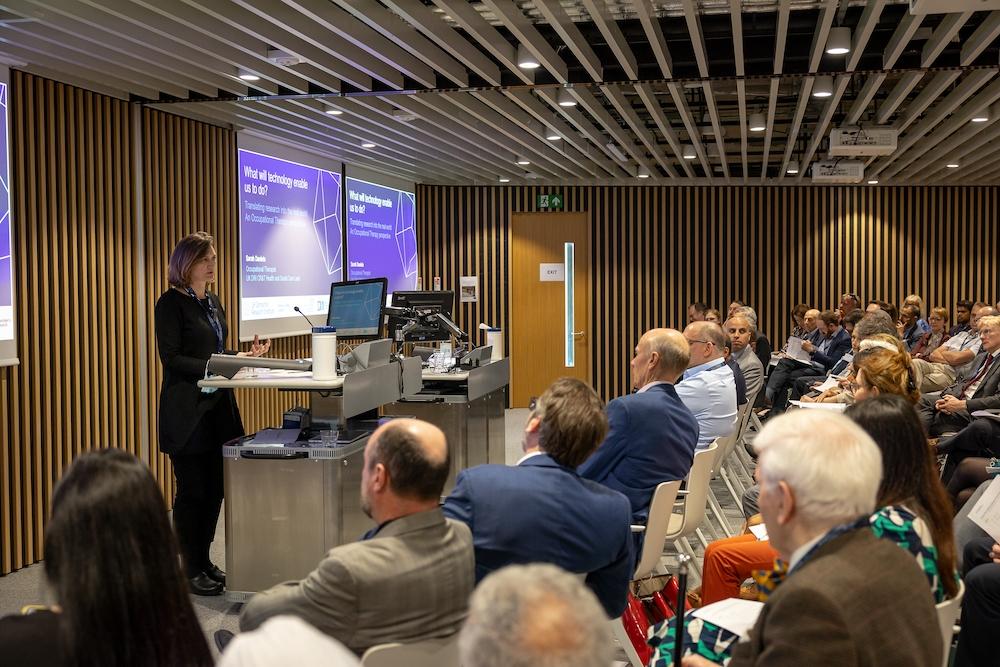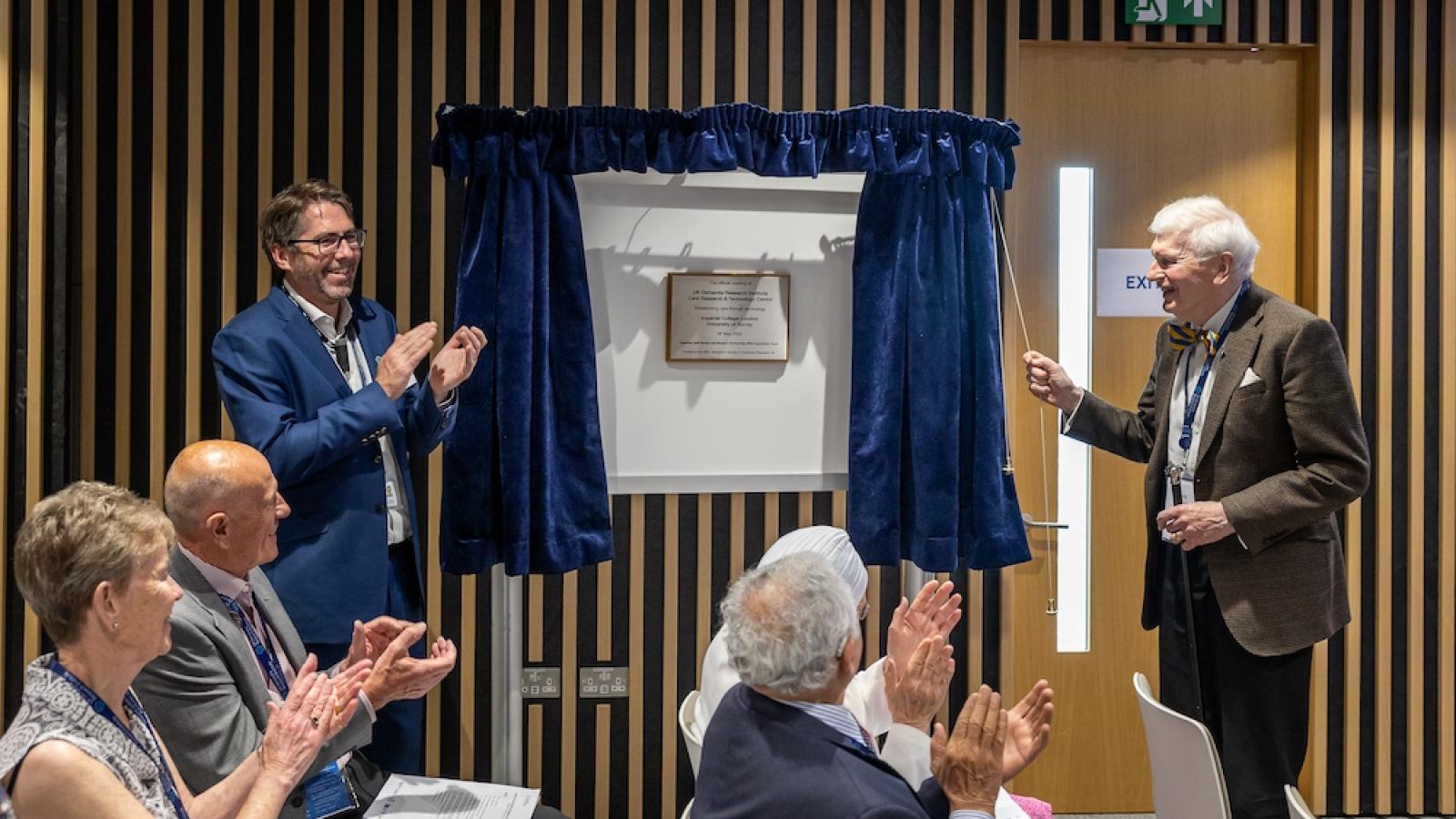In another milestone for the Institute, we marked the official launch of the UK DRI Care Research & Technology Centre this month (20 May) – a multi-million pound research facility to improve the lives of people living with dementia now. Minister of State for Care and Mental Health, Gillian Keegan, joined trial participants, researchers, and partners at the opening event to unveil a plaque commemorating the occasion.
The UK DRI Care Research & Technology Centre brings together scientists from a range of backgrounds, including medicine, engineering, computer science and synthetic biology to develop innovative ‘smart’ technologies – from artificial intelligence to sleep monitoring – to enable people affected by dementia to live safely and independently in their own homes for as long as possible.
Centre Director David Sharp and Centre Manager Danielle Wilson welcomed attendees to an afternoon showcase of talks, panel discussions and tours at the brand-new Sir Michael Uren Hub at Imperial College London’s White City Campus.
“We are thrilled to be officially underway with this research, taking a positive step towards a future where people living with dementia are well supported in their own homes,” said Prof Sharp.
UK DRI Trustee Jo Pisani and Director Bart De Strooper outlined the journey to the Centre’s selection as the seventh node in the Institute network, providing a unique approach for the UK DRI to make real impact for people living with dementia now.
of people would choose to live at home for as long as possible if they were diagnosed with dementia, according to a report by Alzheimer's
“I have never seen so many engineers looking into dementia.”Prof Bart De StrooperUK DRI Director
Minister of State for Care and Mental Health, Gillian Keegan, who visited the Centre earlier in the day to meet the researchers and participants, filmed a short message to attendees, speaking of the Centre as a “brilliant example of the investment the government is putting into dementia research,” ahead of a 10-year dementia strategy set to be unveiled later this year.
Former carer for his late wife who was diagnosed with Alzheimer’s disease in 2016, and a member of the Centre’s original steering committee, Trevor Truman commented on how far the Centre had come since his early conversations with Prof Sharp, remarking on the “world class talent applied to a world problem.” Before unveiling the plaque to attendees, Trevor also spoke movingly about his own experiences and how much value he and his wife got from staying at home, only further highlighting the importance of the Centre’s mission.
To reach and help as many people as possible, the research and clinical team at the Centre aim to make their technology low-cost and accessible, designing practical solutions that can be rolled out across households. Around the Centre, groups showcased different elements of the ‘smart home’, from conversational agents like Amazon’s Alexa, to home radar capable of measuring movement and vital signs unobtrusively.
There were three fascinating talks from the interdisciplinary team, including:
- Eyal Soreq (Research Associate) on harnessing sleep data and AI to assess sleep problems in people with dementia
- Paul Freemont (Group Leader) on using advanced biological methods for early detection and monitoring of urinary tract infections (UTIs)
- Sarah Daniels (Health and Social Lead) on the potential of the technology to help Occupational therapists like herself
The technology is brought together on the new intelligent digital platform (“Minder”) that links information and uses machine learning to identify health risks and social care needs. This platform and new care approaches are currently being evaluated by around 80 people with dementia or mild cognitive impairment and their carers.
With the greatest expectations for the future, I declare this Centre open!Trevor Trumanformer carer and member of Centre steering committee

heard three fascinating talks from the interdisciplinary team.
The Centre, based within the brand-new Sir Michael Uren Hub at Imperial College London’s White City Campus, forming part of the White City Innovation District, is not alone in its efforts with several brilliant collaborations already underway. These include the University of Surrey, where much of the research into sleep takes place at the Surrey Sleep Research Centre, the Helix Centre specialising in patient-led design and clinical monitoring from Surrey & Borders Partnership NHS Foundation Trust.
A unique dementia care ‘test bed’ has been established in partnership with Surrey and Borders Partnership NHS Foundation Trust, Hammersmith & Fulham Council and Hammersmith & Fulham Primary Care Network, with support from Howz and technology providers including Withings and Develco.
“We are already seeing benefits of the technology we have developed on the lives of the people trialling it in their homes, helping them to feel safe, and supporting them to remain in their own homes,” added Prof Sharp. “The new technologies allow us to intervene at an early stage when needed, to prevent the crises that so often lead to hospital stays, or a move to a care home.”
Zohra, a carer for her husband, who is a participant in the Minder study, said:
“As carers, we don’t know how the person we’re caring for is going to progress – how quickly they will get worse. My husband’s memory and comprehension is slowly declining.
“We have these sensors in various parts of the house, you don’t even realise that they’re there. The monitoring team know if someone is active, and whether there is any change in their routine. All the data goes directly to the team via the Minder app. It’s very easy and straightforward to use, and it acts as a kind of invisible support for carers. I think every person with dementia should have these sensors in their home.”
You can find a selection of images from the event on our Flickr.
To find out more about the UK DRI Care Research & Technology Centre, go to the dedicated Centre page or watch this recent promotional film:
hospital beds are occupied by people with dementia, and 20% of these admissions are due to avoidable causes such as falls, dehydration and infections.
Article published: 30 May 2022
